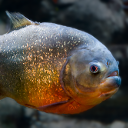The red-bellied piranha (Pygocentrus nattereri) is a species of piranha native to South America, found in the Amazon, Paraguay, Paraná and Essequibo basins, as well as coastal rivers of northeastern Brazil. Despite the piranha’s reputation as a dangerous carnivore, it is primarily a scavenger and forager, and will mainly eat plants and insects during the rainy season when food is abundant.
Assembly
The fPygNat1.pri assembly was submitted by Vertebrate Genomes Project on November 2020. The assembly is on chromosome level, consisting of 358 contigs assembled into 55 scaffolds. From these sequences, 30 chromosomes have been built. The N50 size is the length such that 50% of the assembled genome lies in blocks of the N50 size or longer. The N50 length for the contigs is 12,898,870 while the scaffold N50 is 42,283,192.
Other assemblies
- Pygocentrus_nattereri-1.0.2 (Ensembl release 111)
Gene annotation
The gene annotation process was carried out using a combination of protein-to-genome alignments, annotation mapping from a suitable reference species and RNA-seq alignments (where RNA-seq data with appropriate meta data were publicly available). For each candidate gene region, a selection process was applied to choose the most appropriate set of transcripts based on evolutionary distance, experimental evidence for the source data and quality of the alignments.Small ncRNAs were obtained using a combination of BLAST and Infernal/RNAfold. Pseudogenes were calculated by looking at genes with a large percentage of non-biological introns (introns of <10bp), where the gene was covered in repeats, or where the gene was single exon and evidence of a functional multi-exon paralog was found elsewhere in the genome. lincRNAs were generated via RNA-seq data where no evidence of protein homology or protein domains could be found in the transcript.
In accordance with the Fort Lauderdale Agreement, please check the publication status of the genome/assembly before publishing any genome-wide analyses using these data.
More information
General information about this species can be found in Wikipedia.
Statistics
Summary
| Assembly | fPygNat1.pri, INSDC Assembly GCA_015220715.1, Nov 2020 |
| Base Pairs | 1,222,050,449 |
| Golden Path Length | 1,222,050,449 |
| Annotation provider | Ensembl |
| Annotation method | Full genebuild |
| Genebuild started | Feb 2021 |
| Genebuild released | |
| Genebuild last updated/patched | Mar 2021 |
| Database version | 115.1 |
Gene counts
| Coding genes | 25,729 |
| Non coding genes | 1,760 |
| Small non coding genes | 962 |
| Long non coding genes | 791 |
| Misc non coding genes | 7 |
| Pseudogenes | 271 |
| Gene transcripts | 76,049 |
Other
| Genscan gene predictions | 81,080 |
